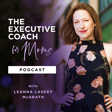
Leading with Purpose: Charting Your Own Course as a High-Achieving Woman - with Dr. Lesley Robinson (part 1)
In part 1 of this inspiring conversation, Leanna talks with Dr. Lesley Robinson, founder of Embolden Education and co-founder of the Ayana Foundation, about what it takes to lead as a woman, a mother, and a visionary.
Dr. Robinson shares how she navigated a decade-long academic dissertation journey, embraced entrepreneurship, and made bold life changes to align her work with her values. From navigating career shifts to balancing motherhood and ambition, her story is a powerful reminder that you don’t have to choose between purpose and personal fulfillment. Together, they talk about the power of reflection, trusting the process, and creating space for both family and big dreams.
If you're a working mom or a woman redefining success on your own terms, this conversation is for you.
🎧 Loved this conversation? Don’t miss Part 2, available June 12, where we dive deeper into the mindset, strategy, and real-world tools women need to lead with impact.
Full transcript available here.
Connect with Leanna here.
If you're ready for deeper transformation, check out The Executive Mom Reset; Leanna’s six-month coaching program designed to help ambitious moms stop merely surviving and start thriving. Book a consult now!
Don’t forget to subscribe, rate, and review the show to help more women find these empowering stories!

